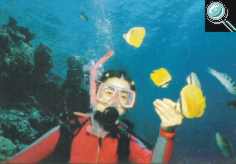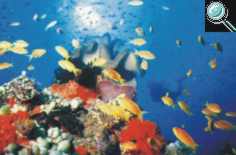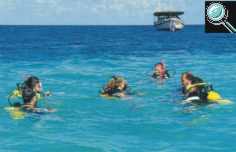 |
|
Diving in the Maldives Strung across the equator in the middle of the vastness of the Indian Ocean, the Maldives is a dream come true for any marine enthusiast. This garland of islands is one of the last unspoiled places on earth - a paradise. It has also been described as an ethereal abstract painting. The treasure that is Maldives unfolds to the visitor as the search continues, through the Maldivian spectrum of blues; be it among other things by diving, taking a leisurely cruise or fishing. |
 |
|
The brilliantly colorful corals reefs, making the Maldivian seascapes amongst the most enchanting in the world, is a nature's treasure house, an El Dorado for diving enthusiasts, providing opportunities to experience the unique and beautiful underwater scenery which is a realm of a great variety of fish, corals, and other marine denizens. The several years of experience of the diving centers, has guaranteed high standards in the selection of resort islands as well as the quality of equipments used and the expertise of the diving staff. |
 |
|
The diving Schools With a few exceptions, all resorts have a fully equipped diving school. Guided dives under the supervision of diving instructors are for novices and those who still haven't gained the necessary confidence. The non-limit, or unguided dives, documents the confidence one feels in his or her dive. However it is the diving instructor who decides as to how confident and how experienced one is in their diving skills. All the dive operations are affiliated with PADI, NAUI, and CMAS and/or employs PADI or NAUI diving instructors. You can also be assured of finding trained and well-qualified professional diving instructors. |
 |
|
Learning to Dive Though diving is considered to be one of the easiest of water sports, carelessness can prove to be dangerous. The beginner not only tends to overestimate himself, being presumptuous, but the problem clearly lies in underestimating the dangers of the ocean and not understanding its ways carefully. As a rule, one must always remember that the diving is at one's own risk. For this reason one should definitely comply with the diving regulations issued by the concerned authorities. Generally these are : 1. Decompression dives are prohibited, even if a dive computer is in use which measures the levels of nitrogen vis-a-vis the respective depth over dive time, diving below depths of 90 feet is prohibited, and 3. wearing a BC is mandatory. Besides these, there are other diving safety rules to be followed. One must never dive alone, despite the numerous shallow diving sites. One must also get acquainted with the site's special features, such as the location of the reef's edge, opening in reef channel, direction, the strength and direction of currents, the sun's position, and so on. Special care must be taken during current diving. Here one must make sure of not venturing faraway from one's boat. Further one must also dive against the current for in case of an emergency the current will bring one back to the boat. Thus training by qualified hands coupled with one's enthusiasm, and a little bit of cautious approach takes one to another world. The mysteries of the ocean beckons one and all, and diving provides an excellent and thrilling opportunity to unravel some of these, the fascinating world of corals being one of them. |
 |
|
[Maldives at a glance] [Sign - Guestbook] [View - Guestbook] |
|
Designed and maintained by Abdulla Shafyq |
|
|
|
|